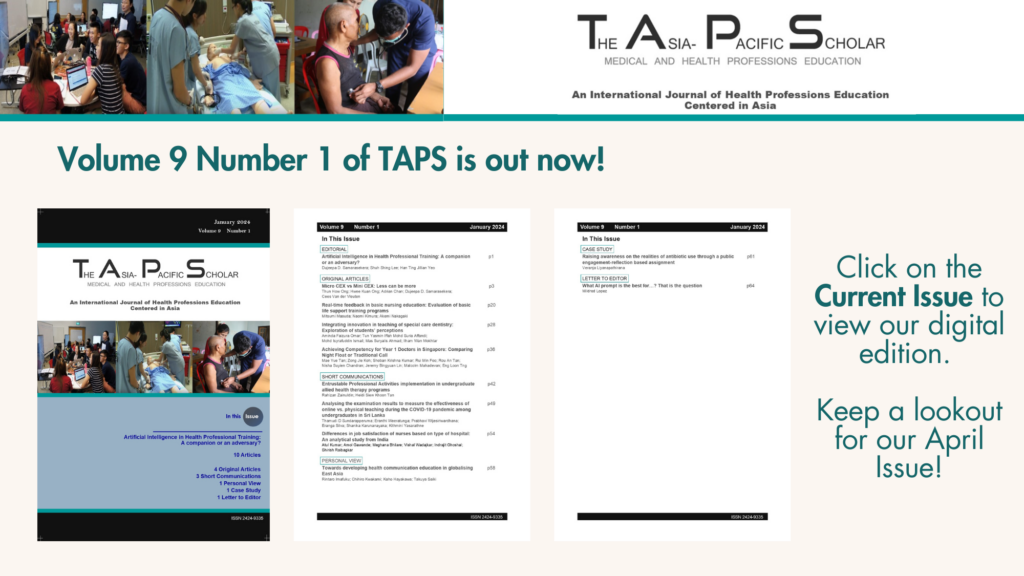Teaching virtue ethics: A Confucian perspective to a fair price in medicine
Published online: 5 September, TAPS 2017, 2(3), 26-27
DOI: https://doi.org/10.29060/TAPS.2017-2-3/PV1035
Gabriel Hong Zhe Wong1, Philip Lin Kiat Yap2 & Lawrence Wei Meng Tan2
1Yong Loo Lin School of Medicine, National University of Singapore, Singapore; 2Department of Geriatric Medicine, Khoo Teck Puat Hospital, Singapore
‘凡为医之道,必先正己,然后正人—-《医工论》
“First cultivate yourself; then cure others”.
Medical education strives to nurture ethical, caring doctors. Given the increasing commercialisation of medical practice, there is a need to include a discussion of ethical pricing in the medical curriculum. Ethical pricing refers to pricing that is both reasonable to the patient and the physician, ensuring that the patient is not used as a means to an end – the physician’s profit – and the fee is commensurate with the physician’s service. We believe the Confucian ethical paradigm, steeped in virtue ethics, can help guide such an educational objective. Confucian ethics offers a unique insight into Singapore’s approach towards medical pricing, perhaps best illustrated by the Singapore Medical Council’s (SMC) judgement on Dr Susan Lim. This can serve to guide and edify future medical practitioners.
While it may be challenging for students who have yet to commence medical practice to appreciate the nuances in medical pricing, incorporating the dialectics of pricing into an existing undergraduate curriculum in medical ethics stresses its importance and can help students better tackle the challenges of intuitive reasoning and ethical decision making in a dynamic real world environment. Some may also note that medical students, after they transition to junior doctors, have little say in the pricing decisions of their institutions. This may be the case even amongst many senior consultants in public and private hospitals. However, there is value in having students consider these issues, to foster greater empathy for the financial considerations of their patients and the challenges of ensuring viability of a medical practice, and in the hope that some can become advocates of ethical pricing within medical associations and in policy-making.
In 2011, Dr Lim, was convicted of overcharging by the SMC and suspended from practice. She had charged Bruneian royalty more than S$20 million for end-of-life care. In arriving at the judgement, SMC determined that there was an “ethical limit” to medical pricing (Singapore Medical Council, 2012) that if transgressed, could bring legal repercussions.
It also ruled “affluence” to be a non-factor in determining price, arguing that wealthy patients should be treated equally to poor ones, although doctors are encouraged to heavily discount the “indigent’s” treatment (Singapore Medical Council, 2012). Western jurisprudence raises concern over physicians’ liberty to freely price based on demand-and-supply, especially since the limit will be determined by “peers” in the profession (Singapore Medical Council, 2012), potentially introducing subjectivity.
There is no denying a wealthy patient’s right-to-health even as the doctor charges high prices. An injured sports personality of celebrity status, for example, saves millions in income and endorsements if the surgeon’s skills can help him achieve a speedy recovery. Since there is no discretionary exploitation occurring, should not the surgeon gain a share commensurate with his efforts?
The “unstated” ethical limit could be better understood through Confucian ethics, a dominant philosophy in Singapore. Confucianism practices a more intuitive, rather than critical, level of ethical reasoning which emphasises humanness. Liberties can only be exercised through participation within a community (Tsai, 2001) and with an emphasis on rites or customs, or “Li” 礼 which may not need to be codified (Wang & Solum, 2012). Therefore, the physician’s behaviour should be guided by the norms and prevailing practice of his fellow practitioners, hence allowing for a dynamic, evolving ethical price limit. Such a limit is governed by ethical and social considerations, unlike the amoral “invisible hand” in the free market.
Additionally, Confucian virtue ethics embraces the nobleman concept, which emphasises the importance of self-regulation. The noble “bears the suffering of patients in mind, not his own material interests” (Guo, 1995). In doing so, he demonstrates the principle of “Ren” 仁 that can transcend “contractual relations” (Low, 2011). Confucius stressed that economic agents must abandon selfish desires in transactions. From this perspective, if a physician seeks personal gain in pricing decisions, he transgresses the ethical limit.
Moreover, Confucianism espouses the principle of “Yi” 义 or righteousness. In the words of ethicist Chen Shih-Kung, it is based on “the idea of treating high or low, rich or poor equally” (Tsai, 1999). Such a principle forbids the discrimination of individuals, including on the basis of wealth. This dovetails with the SMC’s (2012) stand that “we do not, however, accept that the affluence of the patient is an objective criterion which can legitimately be taken into account in setting or assessing what is a fair and reasonable fee” (p. 41) .
However, such a philosophy does not preclude physicians subsidising the care of patients who are unable to afford their fees. As Chen wrote, “Medicine should be given free to the poor. Extra financial help should be extended to the destitute patients if possible. Without food, medicine alone cannot relieve the distress of a patient” (Tsai, 1999). Such a view is echoed by the SMC (2012) which deemed it morally exemplary to charge “an indigent patient a fee which is less than a fair and reasonable fee, or even to waive a fee, simply because the patient is indigent” (p. 41).
From a Confucian viewpoint, a more appropriate pricing yardstick would be the physician charging a price he himself would be willing to pay if he were in the patient’s position. This would come naturally to someone who practices deep self-cultivation such that he naturally embodies the Confucian virtue of Benevolence and Righteousness.
Medical profession’s nobleness cannot be over-emphasised. Confucian tenets can help in its expression.
Notes On Contributor
Gabriel Wong is a Year 2 Yong Loo Lin School of Medicine, NUS student. His interest in ethics and public policy was sparked 5 years ago when he published in the Lianhe Zaobao. Since then, he has published in several journals and hopes to one day shape Singapore’s healthcare future.
Philip Yap is a senior consultant geriatrician and palliative care physician in the Department of Geriatric Medicine and director of the geriatric centre in Khoo Teck Puat Hospital. He is also an Adjunct Associate Professor with the Yong Loo Lin School of Medicine, NUS.
Lawrence Tan is a senior consultant in the Department of Geriatric Medicine at Khoo Teck Puat Hospital. He has an interest in clinical ethics and is a member of the Clinical Ethics Committee in KTPH. He is also a Clinical Lecturer with the Yong Loo Lin School of Medicine, NUS.
Declaration of Interest
The authors declare no competing interests.
References
Guo, Z. (1995). Chinese Confucian culture and the medical ethical tradition. Journal of Medical Ethics, 21(4), 239-246.
Low, K. C. P. (2011). Confucius, the Value of Benevolence and What’s In It For Humanity? Conflict Resolution & Negotiation Journal, 1, 32-43.
Singapore Medical Council (2012). Singapore Medical Council Disciplinary Committee Inquiry for Dr Susan Lim Mey Lee Held on 21, 22, 23 May, 21 June and 17 July 2012. Singapore: Singapore Medical Association. Retrieved from http://goo.gl/m4x4aq
Tsai, D. (1999). Ancient Chinese medical ethics and the four principles of biomedical ethics. Journal of Medical Ethics, 25(4), 315-321.
Wang, L. & Solum, L. B. (2012). Confucian Virtue Jurisprudence. In A. Amaya & H. L. Ho (Eds.), Law, Virtue and Justice. Oxford: Hart Publishing.
*Lawrence Wei Meng Tan
Khoo Teck Puat Hospital
90 Yishun Central
Singapore 768828
Tel: 66023041
Email: tan.lawrence.wm@alexandrahealth.com.sg
Announcements
- Best Reviewer Awards 2024
TAPS would like to express gratitude and thanks to an extraordinary group of reviewers who are awarded the Best Reviewer Awards for 2024.
Refer here for the list of recipients. - Most Accessed Article 2024
The Most Accessed Article of 2024 goes to Persons with Disabilities (PWD) as patient educators: Effects on medical student attitudes.
Congratulations, Dr Vivien Lee and co-authors! - Best Article Award 2024
The Best Article Award of 2024 goes to Achieving Competency for Year 1 Doctors in Singapore: Comparing Night Float or Traditional Call.
Congratulations, Dr Tan Mae Yue and co-authors! - Fourth Thematic Issue: Call for Submissions
The Asia Pacific Scholar is now calling for submissions for its Fourth Thematic Publication on “Developing a Holistic Healthcare Practitioner for a Sustainable Future”!
The Guest Editors for this Thematic Issue are A/Prof Marcus Henning and Adj A/Prof Mabel Yap. For more information on paper submissions, check out here! - Best Reviewer Awards 2023
TAPS would like to express gratitude and thanks to an extraordinary group of reviewers who are awarded the Best Reviewer Awards for 2023.
Refer here for the list of recipients. - Most Accessed Article 2023
The Most Accessed Article of 2023 goes to Small, sustainable, steps to success as a scholar in Health Professions Education – Micro (macro and meta) matters.
Congratulations, A/Prof Goh Poh-Sun & Dr Elisabeth Schlegel! - Best Article Award 2023
The Best Article Award of 2023 goes to Increasing the value of Community-Based Education through Interprofessional Education.
Congratulations, Dr Tri Nur Kristina and co-authors! - Volume 9 Number 1 of TAPS is out now! Click on the Current Issue to view our digital edition.

- Best Reviewer Awards 2022
TAPS would like to express gratitude and thanks to an extraordinary group of reviewers who are awarded the Best Reviewer Awards for 2022.
Refer here for the list of recipients. - Most Accessed Article 2022
The Most Accessed Article of 2022 goes to An urgent need to teach complexity science to health science students.
Congratulations, Dr Bhuvan KC and Dr Ravi Shankar. - Best Article Award 2022
The Best Article Award of 2022 goes to From clinician to educator: A scoping review of professional identity and the influence of impostor phenomenon.
Congratulations, Ms Freeman and co-authors. - Volume 8 Number 3 of TAPS is out now! Click on the Current Issue to view our digital edition.

- Best Reviewer Awards 2021
TAPS would like to express gratitude and thanks to an extraordinary group of reviewers who are awarded the Best Reviewer Awards for 2021.
Refer here for the list of recipients. - Most Accessed Article 2021
The Most Accessed Article of 2021 goes to Professional identity formation-oriented mentoring technique as a method to improve self-regulated learning: A mixed-method study.
Congratulations, Assoc/Prof Matsuyama and co-authors. - Best Reviewer Awards 2020
TAPS would like to express gratitude and thanks to an extraordinary group of reviewers who are awarded the Best Reviewer Awards for 2020.
Refer here for the list of recipients. - Most Accessed Article 2020
The Most Accessed Article of 2020 goes to Inter-related issues that impact motivation in biomedical sciences graduate education. Congratulations, Dr Chen Zhi Xiong and co-authors.









